
King Abdullah bin Abdulaziz
Visionary with an Eye
for Change
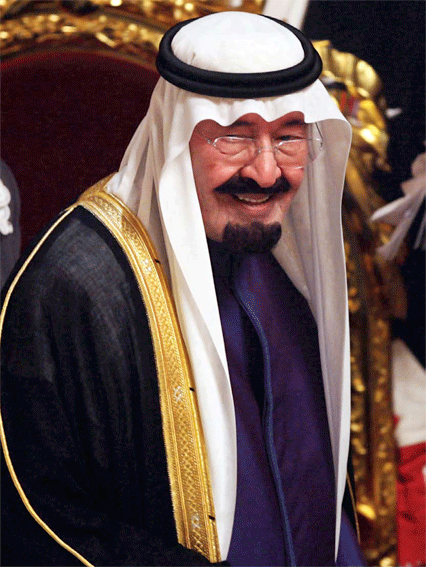 |
King Abdullah bin Abdulaziz, the sixth King of Saudi Arabia,goes by the revered title of 'Custodian of the Two Holy Mosques',and has won global acclaim as a resolute reformist,a champion of contemporary education, an advocate of innovation, and the architect of the Kingdom's future-ready development.
By Vinod Menon
King Abdullah can best be termed as a "people's king." Strongly influenced and motivated by his late father, King Abdulaziz bin Saud, who founded the Kingdom in 1932, King Abdullah bin Abdulaziz has spent his entire lifetime dedicated to the welfare of his people – first as the Crown Prince, and from 2005, as the ruler of the nation.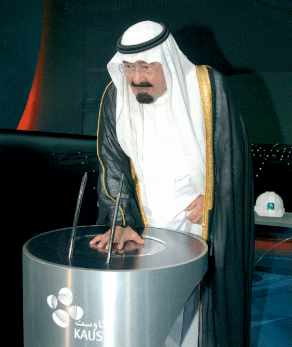
When King Abdullah took over the reins of the Kingdom from his brother, late King Fahd, a little over five years ago, Saudi Arabia was already an ultra-modern nation by any measure. Room for further growth was limited, one would have assumed. But King Abdullah moved on with 'change' in mind, bringing about a national transformation never before witnessed in the kingdom in recent times.
With his reformist agenda, he brought change in social thinking by initiating a global inter faith dialogue, leaped several years ahead with his concept of economic cities, and changed the very concept of education by establishing the King Abdullah University for Science and Technology near Jeddah in western Saudi Arabia.
Social Change
Within months of assuming the throne, King Abdullah brought about social change, particularly in empowering women. Two women were elected to the board of the Jeddah Chamber of Commerce, and in a more significant move, he appointed the first Saudi woman Cabinet minister. Nora Al-Fayez was named by a royal decree as the deputy education minister for girls' affairs.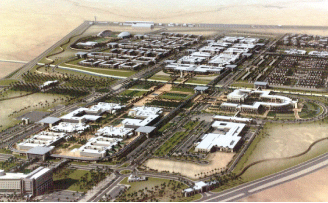
Saudi Arabia also saw its first municipal elections in 2005. Elections for members of the municipal councils were held in three phases; the Riyadh region voted on February 10; the Eastern and Southern regions voted on March 3; and the Western and Northern regions voted in the final phase on April 21. A total of 592 representatives were elected.
In another revolutionary move with strong social implications, King Abdullah introduced the concept of global interfaith dialogue. As a result of his call for the dialogue, religious figures and political leaders from all over the world gathered in Madrid, Spain in July, 2008, speaking the one voice of humanity, above all divisions rooted in faith. This first-ever World Conference on Dialogue brought together representatives of Islam, Judaism, Christianity, Hinduism, Buddhism, Shintoism and Confucianism, with the common message of global love and peace.
Reflecting the mood of the day, Saudi Ambassador to the United States, Adel Al-Jubeir, said: "The idea stemmed from King Abdullah's view that there are universal values that are common to all faiths, and that if we focus on those universal values we will see that there is a lot more that binds us as human beings than divides us."
The success of the event can be gauged from the fact that similar platforms were emulated the world over for bringing about peaceful and harmonious co-existence among various religious groups.
Educational Programs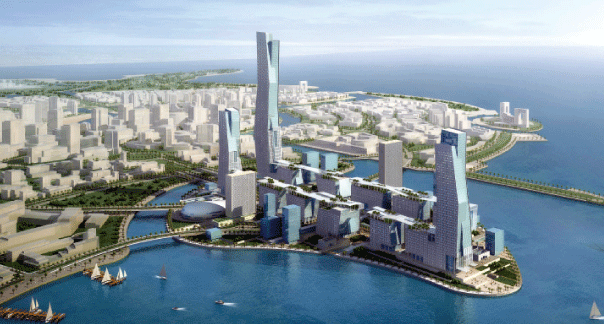
King Abdullah initiated major education schemes to develop human resources for the work market and academic research.
The King Abdullah Foreign Scholarship Program was established in 2006 with the primary aim of imparting quality education to Saudis in the best universities around the world. Under the ambitious program, academic disciplines and scholarships are selected based on the needs of ministries, national corporations and the private sector. The objective here is to fulfill the requirements of the job market and to qualify Saudi youth to play an active role in the kingdom's development.
While Saudi Arabia sent its best students abroad for higher education, it also opened its doors to students from all over the world to study in the kingdom. In a major shift in education policy, King Abdullah established the King Abdullah University for Science and Technology (KAUST) with a vision to be "a globally renowned graduate research university that makes significant contributions to scientific and technological advancement, and will play a crucial role in the development of Saudi Arabia and the world."
The university, inaugurated on September 23, 2009, accepts Saudi as well as foreign students to its fully-funded, science and technology programs. KAUST foresees the university by 2020 to be characterized by "cutting-edge, basic and goal-oriented research in science and technology comparable to that of the world's top 10 science and technology universities."
In yet another boost to science, health sciences this time, King Abdullah laid the foundation of the King Saud University for Health Sciences in Riyadh on April 13, 2008. The vast university will comprise a college of medicine, a college of nursing and allied medical sciences, a college of public health and health informatics, in addition to departments relating to academic affairs, training and development. It will be able to accommodate as many as 17,000 students.
Futuristic Cities
In a far-sighted move to diversify Saudi Arabia's economy away from oil, King Abdullah approved an ambitious plan in 2005 to build economic cities in various parts of the Kingdom. The four mega economic cities in Madinah, Hail, Jizan and Rabigh are expected to draw SR 300 billion in new investment projects and create more than a million new jobs.
In April 2007, it was announced that additional economic cities would be built in Tabuk and in the Eastern Province, bringing the total number of economic cities in the kingdom to six.
The Knowledge Economic City situated in Madinah, is planned to develop the Kingdom's technology base. The investment cost of the city is around SR 25 billion, creating some 20,000 job opportunities.
Prince Abdulaziz bin Mousaed Economic City is in Hail, 720 kilometers north of Riyadh, covers an area of 156 square kilometers. The cost of the city is expected to reach SR 30 billion by the time it is completed in 2016.
The Jizan Economic City, some 725 kms south of Jeddah, will have its own desalination plant and a power plant generating 4,000 MW of electricity. It will cover an area of 100 square kilometers or two-thirds of the entire city. Heavy industry will be a key sector for investment in the city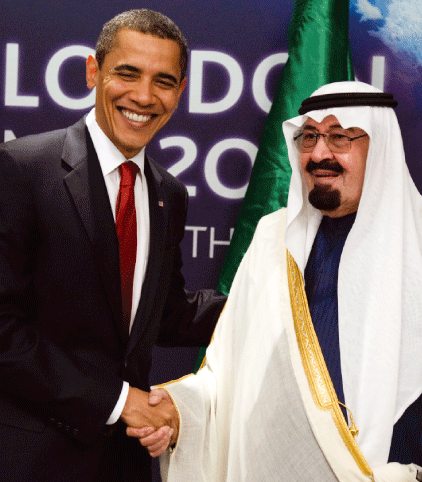
But the jewel among these economic cities is the King Abdullah Economic City. Being built in Rabigh, north of Jeddah, the city, when completed, is expected to be as large as Washington DC. The king has decreed several incentives and measures to promote private sector participation in this mammoth project. The city is made up of a seaport, an industrial zone, a business district, residential and resort areas, and an education zone.
In addition to these mega cities, King Abdullah has also directed the creation of a dedicated financial district in suburban Riyadh. The King Abdullah Financial District, as it is called, will house professionals working within the financial sector and related industries. It will host the headquarters of the Capital Market Authority, the Stock Exchange, banks, financial institutions and other service providers such as accountants, auditors, lawyers, analysts, rating agencies, consultants, and IT providers.
Moreover, in April, 2010, King Abdullah issued a royal decree for the creation of the King Abdullah City for Atomic and Renewable Energy to be located in Riyadh. The plan is a clear reflection of the kingdom's commitment to develop alternative fuel sources, despite its vast oil wealth. The city, still in its early stages of planning, will serve as a center for research and for co-coordinating national and international energy policy. In the words of Hashim bin Abdullah Yamani, a former minister for commerce and trade, and president of the city, "Establishment of the city will contribute to achieving sustainable development in the kingdom through exploiting the science, research and industry of atomic and renewable energy for peaceful purposes."
International Affairs
The King has often sprung pleasant surprises in international affairs. By making landmark visits to four Asian countries – China, India, Pakistan and Malaysia – within a few months of his coronation, he established, what came to be known as, the kingdom's 'look east' policy. His visit to China and India were of particular significance. It was the first visit by a Saudi king to China since the two countries established formal diplomatic relations in 1990. And his visit to India was the first made by a Saudi king to that country in more than 50 years.
The Middle East peace process received a renewed impetus even before King Abdullah acceded to the throne. When he was still crown prince he formulated the Arab Peace Initiative, which has since been fully endorsed by the Arab League. As king, King Abdullah has relentlessly pursued peace in the Middle East, with his initiative playing a crucial part in the renewed search for a just settlement of the conflict.
King Abdullah's involvement in international diplomacy clearly reflects Saudi Arabia's leadership role in the world, particularly in the defense of Arab and Islamic issues and for the achievement of world peace, stability and security.
With King Abdullah's remarkable achievements swelling national pride, it was of little wonder when Saudi citizens unanimously rose together in June, 2010 to mark the 5th anniversary of his accession to the throne. The grand celebrations nationwide highlighted the great achievements made by the king – particularly his unprecedented push for change.